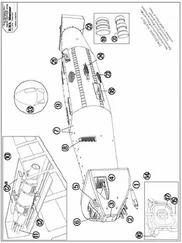David Weber - At All Costs
Здесь есть возможность читать онлайн «David Weber - At All Costs» весь текст электронной книги совершенно бесплатно (целиком полную версию без сокращений). В некоторых случаях можно слушать аудио, скачать через торрент в формате fb2 и присутствует краткое содержание. Жанр: Фантастика и фэнтези, на английском языке. Описание произведения, (предисловие) а так же отзывы посетителей доступны на портале библиотеки ЛибКат.
- Название:At All Costs
- Автор:
- Жанр:
- Год:неизвестен
- ISBN:нет данных
- Рейтинг книги:3 / 5. Голосов: 1
-
Избранное:Добавить в избранное
- Отзывы:
-
Ваша оценка:
- 60
- 1
- 2
- 3
- 4
- 5
At All Costs: краткое содержание, описание и аннотация
Предлагаем к чтению аннотацию, описание, краткое содержание или предисловие (зависит от того, что написал сам автор книги «At All Costs»). Если вы не нашли необходимую информацию о книге — напишите в комментариях, мы постараемся отыскать её.
At All Costs — читать онлайн бесплатно полную книгу (весь текст) целиком
Ниже представлен текст книги, разбитый по страницам. Система сохранения места последней прочитанной страницы, позволяет с удобством читать онлайн бесплатно книгу «At All Costs», без необходимости каждый раз заново искать на чём Вы остановились. Поставьте закладку, и сможете в любой момент перейти на страницу, на которой закончили чтение.
Интервал:
Закладка:
"As expected." Honor examined the indicated plot. "Actually," she said after a moment, "there aren't as many as I'd expected. I wonder if that means they're as light on pods as they were on ships?"
"We can hope, Ma'am," Brigham said. "Of course-"
"There go the scuttling charges, Commodore Jaruwalski!"
Honor and both her staffers turned towards the main plot once more. The range was still long enough that in the visual display, the brief, bright stars which once had been warships of the Republic of Haven were little more than short-lived, brilliant pinpricks. The presentation in the plot was even less dramatic than that. Seven crimson icons simply blinked once, and disappeared.
The bright ruby light chips representing the Herrick System's LACs were still there, but they continued to accelerate steadily away from Honor's ships, obviously bound-as Commodore Milligan had promised-for their base platforms.
"You think they'll turn around if their missile pods get lucky, Ma'am? Brigham asked softly, gazing at the retiring light attack craft.
"That's hard to say." Honor considered the question for a few seconds, then shrugged. "Their pods would have to get awfully lucky to make any difference. If those were Shrikes or Ferrets, it might be different, but they aren't."
"Missile launch!" a Plotting rating announced suddenly. "Multiple missile launches! Time to impact four-point-six minutes!"
"Captain Beauchamp has launched, Commodore!"
Tom Milligan looked up at the announcement. He'd been staring moodily and silently out the pinnace's viewport, gazing out into the endless emptiness which had swallowed up the dispersing plasma of his command. Now he shoved himself out of his seat and stepped quickly to the cramped command deck's hatch.
A pinnace's sensor capability wasn't particularly good at the best of times, and the display was far too small to show much detail, but he could see the wavefront of Beauchamp's outgoing missiles. He'd been surprised when Harrington hadn't tried to insist that he agree to stand them down, as well. In her place, he certainly would have at least made the attempt. Unless, of course, her scouting destroyers had managed to tell her just how threadbare all of Hera's defenses were.
"Estimate eleven hundred-I say again, one-one-zero-zero-inbound," Plotting reported. "Target is Second Division."
"Makes sense," Brigham said quietly. "We're closer to most of their platforms, and two superdreadnoughts have to have less missile defense than four of them."
Honor didn't respond. In fact, she was almost certain her chief of staff didn't even realize she'd spoken aloud.
The tornado of multidrive missiles howled towards them, and whoever had programmed their launch times and accelerations had done her job well. Despite how widely separated many of the launching pods were, their coordination was flawless. All of those missiles would arrive on target simultaneously as a single, tightly focused hammer blow.
The quiet murmur of voices behind her grew louder, more clipped and intense, as Jaruwalski's plotting parties and tactical crews concentrated on their tasks. Not that there was a great deal for them to actually do at this moment. Everything an admiral's staff could do for a situation like this had to happen earlier, in the planning and training stages, when the crews of the individual ships of the admiral's command were learning what was expected of them, and how to perform it.
As Imperator, Intolerant, and their screening heavy cruisers were performing it now.
As little as five or six T-years earlier, that many missiles, fired at a mere pair of superdreadnoughts, would have been both enormous and deadly. Today, it was different. In an era of pod-laying ships of the wall, missile densities like that had become something defense planners had to take into the routine calculations.
Doctrine and hardware had required major modifications, and the modifying process was an ongoing one. The Mark 31 counter-missiles Honor's ships were firing represented significant improvements even over the Mark 30 counter-missiles her command had used as recently as the Battle of Sidemore, only months before. Their insanely powerful wedges were capable of sustaining accelerations of up to 130,000 for as much as seventy-five seconds, which gave them a powered range from rest of almost 3.6 million kilometers.
Kill numbers at such extreme ranges were problematical, to say the least, and the incoming Havenite missiles were equipped with the very best penetration aids and EW systems Shannon Foraker could build into them. That made them much, much better than anything the People's Navy had possessed during the First Havenite War, but BuShips and BuWeaps hadn't precisely been letting grass grow under their feet, either, Honor thought grimly. Her ships mounted at least three times as many counter-missile launchers as ships of their classes had mounted before the advent of pod-based combat.
Their telemetry and control links had been increased by an even higher factor, and each of her ships had deployed additional Mark 20 electronics platforms at the ends of dedicated tractor beams. Nicknamed "Keyhole" by the Navy, the Mark 20 wasn't a traditional tethered decoy, or even an additional sensor platform or Ghost Rider EW platform. These platforms were placed much further from the ships which had launched them, and they had only one function-to serve as fire control telemetry relays. They extended well beyond the boundaries of their motherships' impeller wedges, like an old-style wet-navy submarine's periscope, and they gave the tactical crews aboard those ships the ability to look "down" past the blinding interference of their own outgoing counter-missiles' wedges.
To a civilian, that might have sounded like a small thing, but the implications were huge. The Keyhole platforms were massive and expensive, but they allowed a ship to control multiple counter-missiles for each dedicated shipboard fire control "slot." And they also allowed counter-missile launches to be much more tightly spaced, which added significant depth to the antimissile engagement envelope.
And as a final refinement, the grav-pulse com-equipped reconnaissance arrays deployed in a shell three and a half million kilometers out watched the incoming missiles' EW with eagle eyes, and their FTL data streams provided the missile defense crews aboard Honor's ships a priceless eleven-second advantage. Although the missile controllers and their AIs were still limited to light-speed telemetry links, they were able to refine and update targeting solutions with much greater speed and precision than had ever been possible before.
Shannon Foraker had been forced to rely on mass and sheer numbers, to build a wall in space using thousands of weapons whose individual accuracy was very low. Manticore had approached the problem from a different direction, relying on its technological advantages and superior technique.
The first counter-missile launch killed only a hundred and six of the incoming MDMs. The second, intercepting them less than ten seconds later killed another hundred. But the third launch, with almost twenty seconds for its controllers to react, killed three hundred.
Tom Milligan turned away from the pinnace's tiny display without a word. He returned to his seat, staring out the viewport once again, and his expression was bleak.
One hit, he thought. Surely one frigging hit wasn't too much to ask for!
But the Republic hadn't gotten it. Only forty of Beauchamp's MDMs had broken through the Manties' counter-missiles, and the point defense laser clusters-whose numbers also seemed to have been hugely increased-had blasted those threadbare survivors out of existence well short of attack range.
Читать дальшеИнтервал:
Закладка:
Похожие книги на «At All Costs»
Представляем Вашему вниманию похожие книги на «At All Costs» списком для выбора. Мы отобрали схожую по названию и смыслу литературу в надежде предоставить читателям больше вариантов отыскать новые, интересные, ещё непрочитанные произведения.
Обсуждение, отзывы о книге «At All Costs» и просто собственные мнения читателей. Оставьте ваши комментарии, напишите, что Вы думаете о произведении, его смысле или главных героях. Укажите что конкретно понравилось, а что нет, и почему Вы так считаете.












